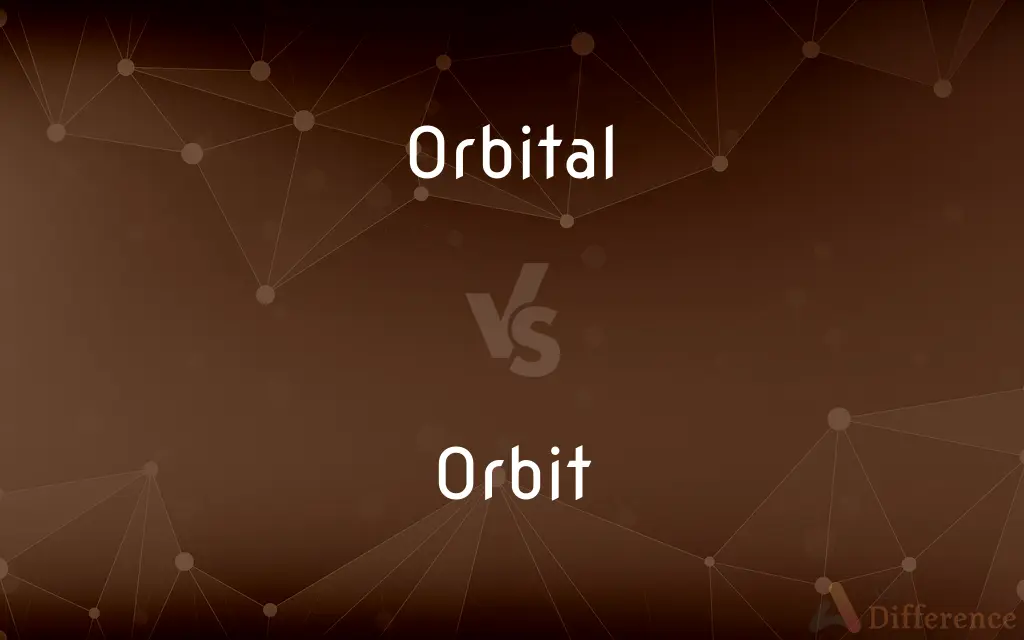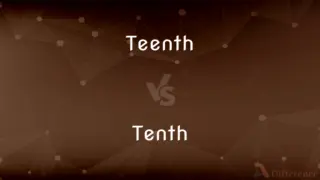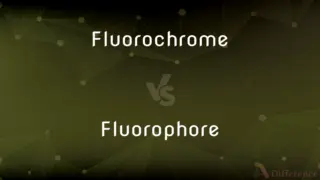Orbital vs. Orbit — What's the Difference?
By Tayyaba Rehman — Updated on October 3, 2023
Orbit is a path an object takes around another. Orbital is related to an orbit or a region in space where electrons are found.

Difference Between Orbital and Orbit
Table of Contents
ADVERTISEMENT
Key Differences
An orbit typically refers to the curved path that an object, such as a planet, takes around another object, like a star. It describes the trajectory or the actual path of that motion. On the other hand, the term orbital can have dual meanings: it can relate to an orbit, or, in chemistry, refer to a specific region in an atom where electrons are most likely to be found.
In astronomical terms, when we speak of Earth’s orbit, we’re discussing the elliptical path Earth takes around the Sun over the span of a year. Conversely, when discussing orbital in this context, it might mean anything related to this orbit, like "orbital speed" or "orbital mechanics".
However, in the realm of atomic physics and chemistry, the word orbital takes on a more specific meaning. Atoms consist of a nucleus and electrons that move around it. These electrons don’t have fixed paths or orbits, but rather, they exist in areas called orbitals where they're most likely to be found. In this context, orbit doesn’t quite have a direct application.
In common usage, orbit is often employed to describe things that circle or revolve around something central. For instance, satellites orbit the Earth. The term orbital, in everyday language, tends to be more of an adjective, as in the "orbital road" that encircles a city.
Lastly, while orbit is more concrete, representing a tangible path or cycle, orbital can be both concrete (as in the orbital bone of the eye) and abstract (as in the aforementioned regions in an atom).
ADVERTISEMENT
Comparison Chart
Nature
Often an adjective.
Typically a noun.
Usage in Astronomy
Related to an orbit (e.g., orbital mechanics).
The path an object takes around another.
Usage in Chemistry
Region in an atom where electrons are likely found.
Not commonly used.
Common Usage
Descriptive term (e.g., orbital road).
Describes a revolving action or path.
Tangibility
Can be abstract or concrete.
More concrete, denoting an actual path or cycle.
Compare with Definitions
Orbital
Relating to an orbit
The satellite's orbital period is 24 hours.
Orbit
The path one object takes around another
Earth's orbit around the sun takes 365.25 days.
Orbital
The bony socket containing the eye
The orbital bone was fractured in the accident.
Orbit
To move around a central point
The moon orbits the Earth.
Orbital
A highway or railway encircling a city
The orbital road helps reduce city traffic.
Orbit
To place a satellite or object into a path around a planet
The spacecraft will orbit Mars.
Orbital
Relating to an orbit or orbits.
Orbit
In physics, an orbit is the gravitationally curved trajectory of an object, such as the trajectory of a planet around a star or a natural satellite around a planet. Normally, orbit refers to a regularly repeating trajectory, although it may also refer to a non-repeating trajectory.
Orbital
An orbital road.
Orbit
The curved path of a celestial object or spacecraft round a star, planet, or moon, especially a periodic elliptical revolution
The Earth's orbit around the sun
Orbital
Each of the actual or potential patterns of electron density which may be formed in an atom or molecule by one or more electrons, and can be represented as a wave function.
Orbit
An area of activity, interest, or influence
Audiences drawn largely from outside the Party orbit
Orbital
Of or relating to an orbit.
Orbit
The cavity in the skull of a vertebrate that contains the eye; the eye socket.
Orbital
The wave function of an electron in an atom or molecule, indicating the electron's probable location.
Orbit
(of a celestial object or spacecraft) move in orbit round (a star or planet)
Mercury orbits the Sun
Orbital
Of or relating to, or forming an orbit (such as the orbit of a moon, planet, or spacecraft).
Orbit
The path of a celestial body or an artificial satellite as it revolves around another body due to their mutual gravitational attraction.
Orbital
(anatomy) Of or relating to the eye socket eyehole.
Orbit
One complete revolution of such a body.
Orbital
Passing around the outside of an urban area.
The M25 is an orbital motorway around London.
Orbit
The path of a body in a field of force surrounding another body; for example, the movement of an atomic electron in relation to a nucleus.
Orbital
Ellipsis of orbital motorway.
Orbit
A range of activity, experience, or knowledge.
Orbital
(physics) A specification of the energy and probability density of one or more electrons at any point in an atom or molecule, and can be represented as a wave function.
Orbit
A range of control or influence
"What magnetism drew these quaking ruined creatures into his orbit?" (Malcolm Lowry).
Orbital
Of or pertaining to an orbit.
Orbit
Either of two bony cavities in the skull containing an eye and its external structures. Also called eye socket.
Orbital
Of or relating to an orbit;
Orbital revolution
Orbital velocity
Orbit
To move in an orbit.
Orbital
Of or relating to the eye socket;
Orbital scale
Orbital arch
Orbit
To revolve around (a center of attraction)
The moon orbits Earth.
Orbital
A region in an atom where electrons are found
The p orbital has a dumbbell shape.
Orbit
To put into an orbit
The space agency orbited a new satellite.
Orbital
Relating to or resembling the orbit of an astronomical object
The orbital movement of the moon around the Earth is complex.
Orbit
(astronomy) A circular or elliptical path of a celestial object or spacecraft around a star, planet, moon, or Lagrange point, especially a periodic elliptical revolution.
Orbit
One complete circuit round an orbited body.
The Moon's orbit around the Earth takes nearly one month to complete.
Orbit
(uncountable) The state of moving in an orbit.
Orbit
(physics) The path of an electron around an atomic nucleus.
Orbit
(pinball) A path for the ball on the outer edge of the playfield, usually connected so that the ball entering in one end will come out of the other.
Orbit
A sphere of influence; an area or extent of activity, interest, or control.
In the post WWII era, several eastern European countries came into the orbit of the Soviet Union.
The convenience store was a heavily travelled point in her daily orbit, as she purchased both cigarettes and lottery tickets there.
Orbit
(anatomy) The bony cavity in the skull of a vertebrate containing the eyeball.
Orbit
(zoology) The area around the eye of a bird or other animal.
Orbit
(mathematics) A collection of points related by the evolution function of a dynamical system. Category:en:Curves
Orbit
The subset of elements of a set X to which a given element can be moved by members of a specified group of transformations that act on X.
Orbit
(informal) A state of increased excitement, activity, or anger.
Dad went into orbit when I told him that I'd crashed the car.
Orbit
(astronomy) To circle or revolve around another object or position.
The Earth orbits the Sun.
The satellite orbits the Lagrange point.
Orbit
To place an object (e.g. a satellite) into an orbit around a planet.
A rocket was used to orbit the satellite.
Orbit
To move around the general vicinity of something.
The harried mother had a cloud of children orbiting her, begging for sweets.
Orbit
To move in a circle.
Orbit
(transitive) To center (around).
Orbit
To continue to follow and/or engage with someone via social media after breaking up with them.
Orbit
The path described by a heavenly body in its periodical revolution around another body; as, the orbit of Jupiter, of the earth, of the moon.
Orbit
An orb or ball.
Roll the lucid orbit of an eye.
Orbit
The cavity or socket of the skull in which the eye and its appendages are situated.
Orbit
The skin which surrounds the eye of a bird.
Orbit
The (usually elliptical) path described by one celestial body in its revolution about another;
He plotted the orbit of the moon
Orbit
A particular environment or walk of life;
His social sphere is limited
It was a closed area of employment
He's out of my orbit
Orbit
An area in which something acts or operates or has power or control:
The range of a supersonic jet
The ambit of municipal legislation
Within the compass of this article
Within the scope of an investigation
Outside the reach of the law
In the political orbit of a world power
Orbit
The path of an electron around the nucleus of an atom
Orbit
The bony cavity in the skull containing the eyeball
Orbit
Move in an orbit;
The moon orbits around the Earth
The planets are orbiting the sun
Electrons orbit the nucleus
Orbit
A field of influence or activity
That topic is not within my orbit of expertise.
Orbit
A regular, repeating path or circuit
The shuttle made 80 orbits before returning.
Common Curiosities
Can we see orbits with the naked eye?
Not the orbits themselves, but we can observe objects moving in their orbits like planets around the sun.
Are all orbitals in atoms the same shape?
No, there are different shapes like s, p, d, and f orbitals.
Is orbital always related to orbit?
Mostly, but in chemistry, orbital refers to where electrons are likely found, unrelated to the traditional orbit concept.
Is an orbital a fixed path like an orbit?
In chemistry, no. An orbital is a probable region for electrons, not a fixed path like an orbit.
What’s an orbital road?
It's a road that goes around a city, similar to how an object in orbit goes around another.
How is orbit used in a non-astronomical sense?
It can denote influence, range, or scope, e.g., "The topic is out of my orbit."
Are orbitals in chemistry actual paths?
No, they're regions where there's a high probability of finding an electron.
Can orbit be used as a verb?
Yes, e.g., "The satellite orbits the Earth."
Is the orbital bone related to orbits in space?
Only by analogy; it's the bone surrounding the eye, which is a round, orbit-like shape.
How are orbital and orbit related in terms of space?
An orbit is a path, while orbital often describes attributes or phenomena related to that path.
Share Your Discovery

Previous Comparison
Teenth vs. Tenth
Next Comparison
Fluorochrome vs. FluorophoreAuthor Spotlight
Written by
Tayyaba RehmanTayyaba Rehman is a distinguished writer, currently serving as a primary contributor to askdifference.com. As a researcher in semantics and etymology, Tayyaba's passion for the complexity of languages and their distinctions has found a perfect home on the platform. Tayyaba delves into the intricacies of language, distinguishing between commonly confused words and phrases, thereby providing clarity for readers worldwide.














































